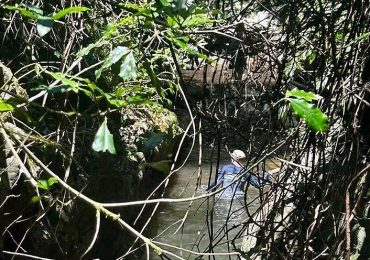Senate Inquiry Submission
Greenpeace Australia Pacific – November 2025
SUMMARY
Greenpeace Australia Pacific (‘Greenpeace’) urges the Australian parliament in the strongest possible terms to amend the Environmental Protection and Biodiversity Conservation Act (‘EPBC Act’) to protect and renew Australia’s magnificent natural environment.
The overhaul of the EPBC Act is long overdue. The Australian people are entitled to assume that the Australian government will act as the wise steward of our nation’s extraordinary natural estate. Yet it is a matter of public notoriety that the EPBC Act has failed to sufficiently safeguard the Matters of National Environmental Significance (MNES) that the legislation purports to protect. It is fundamental that the Australian parliament takes the current once-in-a-generation opportunity to deliver on a meaningful reform package.
While the Environment Protection Reform Bill 2025 (and related) Bills (‘the Bills’) that are currently before the parliament do offer some elements of improved regulatory architecture, Greenpeace is nonetheless deeply concerned that a number of very serious and unacceptable flaws exist within what is currently proposed, particularly in relation to tackling deforestation, taking proper cognisance of climate change impacts, and in relation to various important sundry matters that go to overall effectiveness and integrity. The effective future protection of MNES is contingent on the remedying of these significant problems with the Bills.
Greenpeace urges the parliament to significantly strengthen the Bills in order to deliver a reform package that makes good on the enduring duty to protect and renew Australia’s incredible natural environment. Specifically, this submission addresses four key tests of success for the reforms:
Ensuring strong upfront nature protections.
Establishing a strong, national and independent EPA
Closing loopholes and creating a positive agenda to tackle deforestation
Embedding climate change impact considerations
Greenpeace calls for the Bills to be amended as outlined in this submission, and then enacted as soon as possible.
About Greenpeace
Greenpeace Australia Pacific is an environmental campaigning organisation. Our mission is to secure an earth capable of nurturing life in all of its magnificent diversity. Greenpeace Australia Pacific is an autonomous entity headquartered in Sydney with more than one million people participating across all platforms in our network. We participate as part of the global Greenpeace network. Greenpeace is fully independent, accepting no funding from any government, business or political party anywhere in the world.
TESTS OF SUCCESS AND RECOMMENDATIONS FOR REFORMS
1. Strong upfront nature protections
The EPBC Act has failed to sufficiently safeguard the MNES that it purports to protect. Strong upfront protections, the removal of ministerial discretion wherever possible, and strengthening the role of the Commonwealth are critical to the Act achieving its titular legislative objectives of protecting the environment and conserving biodiversity.
1.1 Unacceptable impacts’ are welcome but require tightening
Greenpeace welcomes the addition of definitions of ‘unacceptable impacts’ to the EPBC as fundamentally important. However, the presence of unwarranted discretions seriously undermines the potential effectiveness and strength of this element, and should be removed, to be replaced with clear objective tests. For example, instances of the phrase ‘be satisfied with’, should be replaced with language that is definite and objective, such as ‘complies with’ or ‘must be consistent with’.
1.2 National Environmental Standards are an asset but need to set clear and enforceable protections
National Environmental Standards were the centrepiece of the Samuels Review and are critical to ensuring improved environmental outcomes. Greenpeace welcomes the proposed creation of New Environmental Standards, so long as these are sufficiently strong and robust to protect MNES. It is essential that the new components of the Act set clear and enforceable protections for nature and in order to result in transparent, accountable and effective decision-making. Greenpeace welcomes the ‘non regression principle’ being made applicable to the proposed new National Environmental Standards.
It is Greenpeace’s intention to provide a more detailed response to the National Environmental Standards through the separate National Environmental Standards consultation process.
1.3 Increased penalties and stop work orders are essential
Greenpeace strongly welcomes the proposed significant increase in penalties that can be imposed for breaches of compliance, and the proposed new power to impose stop work orders.
1.4 Biodiversity offsets reforms contain some improved measures but are undermined by offset fund
Offsets are an inherently problematic and unreliable way of attempting to mitigate against environmental harm. Nonetheless, introducing a ‘Net Gain’ test to ensure improved overall nature protection and the ‘mitigation hierarchy’ to ensure that offsets are only used and permitted as a last resort are notable improvements on the especially deeply flawed current offset system. However, the proposed offset fund is too flexible and could mean that projects are approved with no real guarantee that genuine offsets will be delivered, or that environmental outcomes will be achieved. Public reporting and transparency around offsets is required and there needs to be assurance offsets are available before proponents use the fund. We recommend that there is limited use of the offsets fund otherwise they will become the default option and a single point of failure for the entire reforms.
1.5 ‘National Interest Proposal’ exemption and approval is alarmingly broad
Amendments in the Bills link existing exemptions within the EPBC Act to the new regulatory framework but also add a new class of ‘National Interest Proposals’. This definition is extremely and unnecessarily broad, allowing for exemptions for projects, for example, that address ‘Australia’s obligations under an agreement with one or more other countries’. It is fundamental that any national interest exemptions only apply to genuine emergency situations, so as to avoid becoming what would in effect be a backdoor for wide ranging ministerial discretion that would undermine the effectiveness of the Act. The new national interest exemption for ‘national interest proposals’ is unconstrained, unnecessary and potentially compromises the application of standards, unacceptable impacts and other protections. In any event, fossil fuel projects should be exempted from being considered ‘in the national interest’.
1.6 Commonwealth should retain powers and not cede to states through accreditation
As a matter of clear principle, MNES should properly remain the province of the national government. Accordingly, Greenpeace opposes the Commonwealth ceding environmental decision-making power and responsibility to states and territories, including through the proposed ruling provisions. Decisions regarding the water trigger should remain solely the domain of the Commonwealth Government.
1.7 ‘Minor works’ proposal undermines the functioning of the Act and should be rejected
There is a proposal for minor works to be permitted to commence prior to any approval being obtained, creating the clear risk of environmental destruction without proper impact assessment. This proposal subverts proper process and the protective purpose of the Act because it wrongly assumes that an approval will be given, and may impede impact accurate assessment by changing the environmental baseline. This proposal should be rejected.
1.8 Streamlined approvals to strictly apply to low risk projects
As presently drafted, the proposed streamlined assessment pathway could be used to fast-track even high-risk projects, unacceptably limiting public participation in the process and resulting in inadequate impact assessment. The use of this pathway should be expressly and strictly limited to low risk projects.
1.9 Protection statements must work in conjunction with, rather than override conservation planning
The proposed addition of protection statements would replace recovery plans and conservation advices. This proposal gives too much discretion to the minister to override objective and important scientific information and the need and obligation to protect species. Protection statements need to provide equal or greater protection than recovery plans and conservation advices. The existing requirements to not act inconsistently with recovery plans or threat abatement plans needs to remain. The protection statements instead must be aligned with these other planning instruments and reflect the key protection measures required to secure the viability of protected matters.
1.10 NOPSEMA
Any legislative change applicable to the category of activities covered by NOPSEMA should only be considered if it will have the effect of increasing applicable nature protection and biodiversity conservation.
2. Strong and independent EPA
Compliance and enforcement of the EPBC Act is currently weak and there is low trust within the community in the regulatory process. Broad discretion and ministerial decision-making under the EPBC Act undermine environmental protection. Decisions on assessments and approvals should be made by reference to nature protection outcomes, including the National Environment Standards. The Australian people should be able to assume that MNES will be protected, free from political interference. An independent national EPA able to make decisions on merit would ensure a more effective approach to decision making to protect MNES, improving nature protection and to addressing the inefficiencies that come with the variability that arises from discretionary decision making.
2.1 National EPA should be the decision maker
In order to ensure high public trust and integrity, the EPA should be the decision maker, at arms length from political interference rather than the minister as default decision maker, as proposed.
3. Deforestation loopholes
Australia has one of the worst rates of deforestation in the world. This ongoing destruction of habitat is in turn a major driver threatening species extinction, and other environmental damage such as soil erosion, poor river health and harmful runoff within the catchment area of the Great Barrier Reef. Australia’s appalling levels of deforestation are driven primarily by bulldozing for agricultural pasture, and native forest logging, yet both of these forms of destructive land-use are virtually exempt under the EPBC Act as it stands and is currently administered. It is essential that these unacceptable loopholes are closed.
3.1 Agricultural deforestation should not be exempt
The loophole exemption for ‘continuations of use’ (s43B) undermines the ability of the EPBC Act to protect MNES and should be amended. This is especially the case in the agricultural sector where the exemption has created confusion, and is routinely interpreted as excluding deforestation from regulation under the Act in a manner broader than intended and inconsistently with the purpose of the legislation. This section should be amended to specify that a range of vegetation clearing, expressly including regenerating forest, is not exempt under the Act
3.2 Native forest logging should not be exempt
The exemption for native forest logging should be removed altogether. At a bare minimum, National Environmental Standards and all aspects of the amended EPBC Act should apply to Regional Forest Agreements as an accredited arrangement subject to EPA oversight, including protecting forest upfront where there are likely to be significant impacts to threatened species habitat if logging occurs.
The closure of legislative loopholes, should be augmented by three key non-legislative measures to form part of an overall national approach to effectively addressing Australia’s deforestation crisis, namely
Deforestation policies and guidelines should be strengthened as part of the package
Updated significant impact guidelines should accompany the amended legislation and should include a priority section on deforestation, outlining the proposed application of the amended Act. A national threat abatement plan for deforestation or land clearing should also be developed, setting out key actions to reduce the impacts of deforestation.
Deforestation should be declared a compliance priority
Ensure deforestation is a major compliance priority, including setting explicit expectations this will be a key function of the new EPA.
A national deforestation mapping and early detection system should be established
The minister should use the newly established EIA to develop or commission a national deforestation mapping, monitoring and early detection system that can both report on national deforestation (and destruction of non forest natural ecosystems) annually, and provide a real-time monitoring and enforcement tool for the new national EPA. This could include complimentary priority mapping of threatened species habitat in deforestation hotspots in Queensland, New South Wales and the Northern Territory, giving landholders greater certainty in relation to their obligations under the EPBC Act and resulting in greater levels of environmental protection.
4. Climate considerations
As the National Climate Risk Assessment made freshly clear when released in September of this year, climate change is a severe and worsening threat to MNES. The existing EPBC Act makes very little reference to climate and in order for the legislation to have integrity, it must take proper account of the substantive real world impacts of climate change on MNES. Climate considerations must be firmly embedded into the legislation in order for the Act to be properly cognisant of the real threat to environmental protection and biodiversity conservation created by climate change impacts.
4.1 Explicitly exclude fossil fuel development from state and territory accredited approvals
Given their high level impact on MNES, fossil fuel projects should be excluded from any accredited approval arrangement with a state or territory. All powers should remain with the Commonwealth.
4.2 Require full disclosure of all emissions
The Samuel review recommendation for referrals to include disclosure of emissions should be extended to cover all emissions—all new project proposals should disclose scope 1, 2 and downstream scope 3 emission expected across the life of the project, not just scope 1 and 2 as currently proposed.
4.3 Make compatibility with Safeguard Mechanism part of assessment
Amendments should be included to ensure that the Climate Change Minister is consulted prior to an approval decision to ensure a project is consistent with the emissions budget set out under the Safeguard Mechanism regulation before the EPA decision-maker is able to make a final approval decision.
4.4 Ensure decisions are consistent with international climate obligations
We recommend that Part 9 of the Act is amended to add a new provision stipulating that in deciding whether or not to approve the taking of action under Part 9, and what conditions to attach to such an approval, the EPA or the Minister must not act inconsistently with Australia’s international climate obligations or international law. A similar amendment should be made to other EPBC Act requirements for consistency with international obligations, for example in relation to endorsement of Strategic Assessments under Part 10.
Leave a comment



